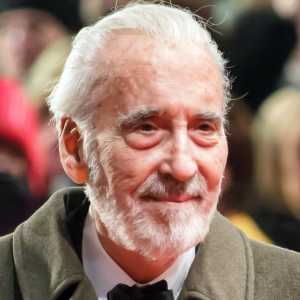Sir Christopher Frank Carandini Lee CBE CStJ (27 May 1922 – 7 June 2015) was an English actor and singer. In a long career spanning more than 60 years, Lee often portrayed villains, and appeared as Count Dracula in seven Hammer Horror films, ultimately playing the role nine times. His other film roles include Francisco Scaramanga in the James Bond film The Man with the Golden Gun (1974), Count Dooku in several Star Wars films (2002–2008), and Saruman in both the Lord of the Rings film trilogy (2001–2003) and the Hobbit film trilogy (2012–2014).
Lee was knighted for services to drama and charity in 2009, received the BAFTA Fellowship in 2011, and received the BFI Fellowship in 2013. He credited three films for making his name as an actor, A Tale of Two Cities (1958), in which he played the villainous marquis, and two horror films, The Curse of Frankenstein (1957), and Dracula (1958). He considered his best performance to be that of Pakistan's founder Muhammad Ali Jinnah in the biopic Jinnah (1998), and his best film to be the British cult film The Wicker Man (1973). He frequently appeared opposite his friend Peter Cushing in horror films, and late in his career had roles in five Tim Burton films.
Prior to his acting career, Lee served in the Royal Air Force as an intelligence officer, attached to the No. 260 Squadron RAF as a liaison officer for the Special Operations Executive. Following his World War II service he retired from the RAF in 1946 with the rank of flight lieutenant.
Known as an actor with a deep, strong voice, Lee also sang, recorded opera and musical pieces between 1986 and 1998, and the symphonic metal album Charlemagne: By the Sword and the Cross in 2010, after having worked with several metal bands since 2005. The heavy metal follow-up Charlemagne: The Omens of Death was released in 2013 on Lee's 91st birthday. He was honoured with the "Spirit of Hammer" award at the 2010 Metal Hammer Golden Gods Awards ceremony.
Early life :
Lee was born on 27 May 1922 in Belgravia, London, the son of Lieutenant Colonel Geoffrey Trollope Lee (1879–1941) of the 60th King's Royal Rifle Corps, and his wife, Countess Estelle Marie (née Carandini di Sarzano; 1889–1981). Lee's father fought in the Boer War and First World War, and his mother was an Edwardian beauty who was painted by Sir John Lavery, Oswald Birley, and Olive Snell, and sculpted by Clare Sheridan. Lee's maternal great-grandfather, Jerome Carandini, the Marquis of Sarzano, was an Italian political refugee; his wife, Lee's great-grandmother, was English-born opera singer Marie Carandini (née Burgess). He had an elder sister, Xandra Carandini Lee (1917–2002).
Lee's parents separated when he was four and divorced two years later.During this time, his mother took his sister and him to Wengen in Switzerland.After enrolling in Miss Fisher's Academy in Territet, he played his first role, as Rumpelstiltskin.They then returned to London, where Lee attended Wagner's private school in Queen's Gate, and his mother married Harcourt George St-Croix Rose, a banker and uncle of Ian Fleming. Fleming, author of the James Bond novels, thus became Lee's step-cousin. The family moved to Fulham, living next door to the actor Eric Maturin. One night, he was introduced to Prince Yusupov and Grand Duke Dmitri Pavlovich, the assassins of Grigori Rasputin, whom Lee was to play many years later.
When Lee was nine, he was sent to Summer Fields School, a preparatory school in Oxford, some of whose pupils later attended Eton. He continued acting in school plays, though "the laurels deservedly went to Patrick Macnee." Lee applied for a scholarship to Eton, where his interview was in the presence of the ghost story author M.R. James. His poor maths skills meant that he was placed eleventh, and thus missed out on being a King's Scholar by one place. His step-father was not prepared to pay the higher fees that being an Oppidan Scholar meant, so instead he attended Wellington College, where he won scholarships in the classics, studying Ancient Greek and Latin. Aside from a "tiny part" in a school play, he did not act while at Wellington. He was a "passable" racquets player and fencer and a competent cricketer but did not do well at the other sports played: hockey, football, rugby and boxing. He disliked the parades and weapons training and would always "play dead" as soon as possible during mock battles. Lee was frequently beaten at school, including once at Wellington for "being beaten too often," though he accepted them as "logical and therefore acceptable" punishments for knowingly breaking the rules. At age 17, and with one year left at Wellington, the summer term of 1939 was his last. His step-father had gone bankrupt, owing £25,000.
His mother separated from Rose, and Lee had to get a job, his sister already working as a secretary for the Church of England Pensions Board. With most employers on or preparing to go on summer holidays, there were no immediate opportunities for Lee, who was sent to the French Riviera, where his sister was on holiday with friends. On his way there he stopped briefly in Paris, where he stayed with the journalist Webb Miller, a friend of Rose, and witnessed Eugen Weidmann's execution by guillotine – the last public execution performed in France. Arriving in Menton, he stayed with the Russian Mazirov family, living among exiled princely families. It was arranged that he should remain in Menton after his sister had returned home, but with Europe on the brink of war, he returned to London instead.He worked as an office clerk for United States Lines, taking care of the mail and running errands.
